Composer Wolfgang Amadeus Mozart and singer Constanze Weber were married on 4 August 1782.
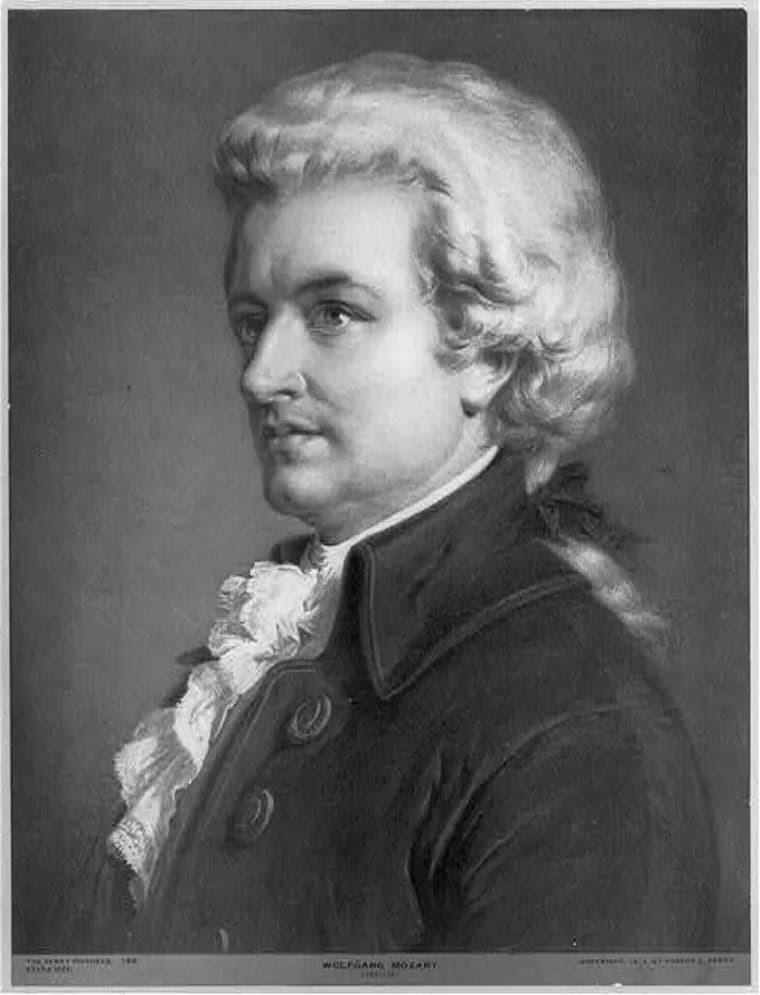
© media-cldnry.s-nbcnews.com
Their courtship had been dramatic. They had started dating the summer of the previous year (after Wolfgang had initially fallen in love with Constanze’s sister). They discussed marriage, but Wolfgang’s father, Leopold, was firmly against it.
Then, in April 1782, they broke up after Constanze had played a parlor game with another young man, during which he measured her calves.
However, after a while, she and Wolfgang made up. In July of 1782, they even moved in with each other…without getting married first!
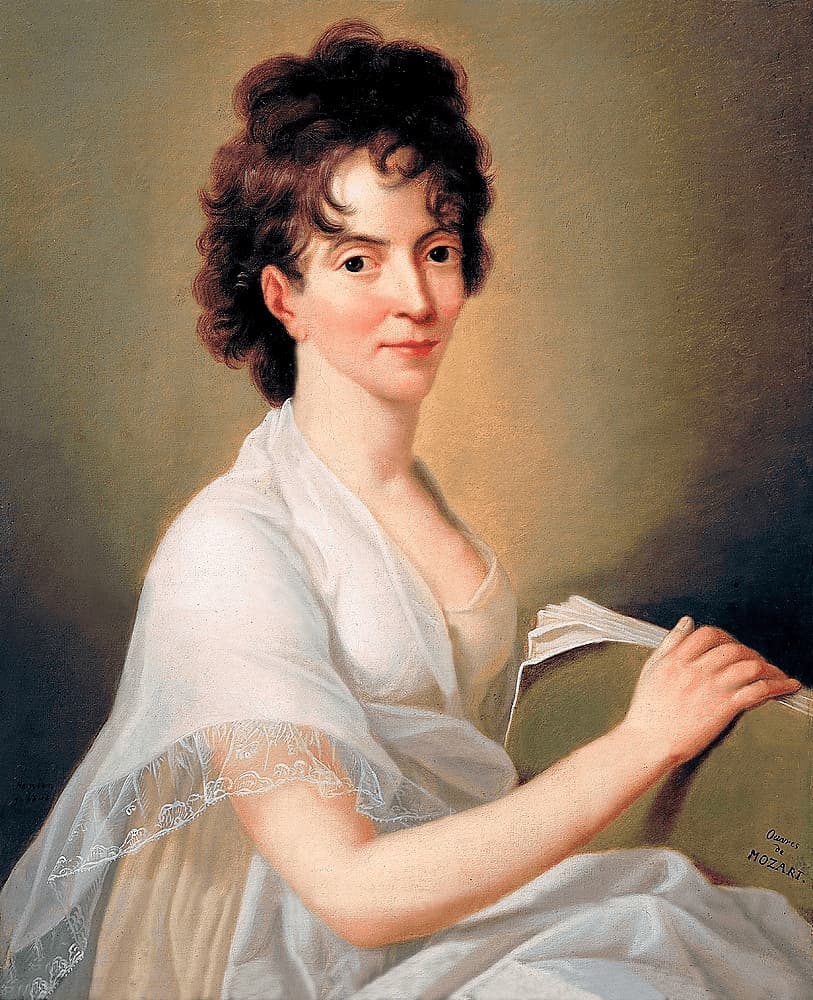
Constanze Mozart in 1802, portrait by Hans Hansen © Wikipedia
The situation proved scandalous. Wolfgang admitted to his father that they were already sleeping together, so he claimed they had no choice but to get married. Constanze’s mother was beside herself, inquiring whether the police could get involved to rescue her daughter and save her reputation.
Amidst all of this drama, the two did finally get married. The morning after their wedding, Leopold’s extremely reluctant permission arrived in the mail.
The story of Constanze’s pregnancies and their children’s lives offer a unique lens through which to understand Mozart’s biography and music. Today, we’re looking at the six children that Wolfgang and Constanze had together between 1783 and 1791.
Raimund Leopold Mozart (17 June 1783 – 19 August 1783)
On 17 June 1783, around one o’clock in the morning, Constanze Mozart went into labor with her first baby.
While Constanze gave birth, Wolfgang nervously composed two movements of his D-minor string quartet. (Constanze later claimed that the chromatic minuet was inspired by her screams.)
Mozart: String Quartet K 421 in D Minor
Five hours after Constanze’s labor began, Raimund Leopold Mozart was born: “a fine, sturdy boy, round as a butterball,” Wolfgang reported to his father in a letter the following day.
The Mozarts named the baby Raimund after their landlord. Oddly, their landlord served as the baby’s godfather instead of Leopold. According to Wolfgang, he wanted to call the baby Leopold, but the landlord offered his services as a godparent, and Wolfgang felt helpless to resist. Either Wolfgang was spineless, or it was an attempt to escape his father’s influence.
The Mozarts hired a wet nurse to help care for little Raimund. “Against my wishes and yet not altogether against my will, they brought in a wet nurse for the child!” he reported to his father.
Over the course of the summer of 1783, Wolfgang made plans to visit his father Leopold in his hometown of Salzburg. Wolfgang was leery of leaving Vienna; he was concerned about being arrested, as he’d left his job with the Salzburg archbishop without officially resigning. His father laughed these concerns off and accused his son of just not wanting to see him.
Feeling guilty about Leopold’s jab, he set off with Constanze to Salzburg six weeks after the baby had been born. They left Raimund behind in Vienna (we don’t know why or with whom), choosing not to introduce him to Leopold. Raimund died in mid-August before the visit was over.
We have very little evidence as to how Wolfgang and Constanze handled the death of their firstborn child. Mozart’s sister didn’t mention it in her diaries. A couple of months later, Mozart wrote to Leopold, “We are both very sad about our poor, bonny, fat, darling little boy.” And that’s the last we hear about him in the historical record.
Karl Thomas Mozart (21 September 1784 – 31 October 1858)
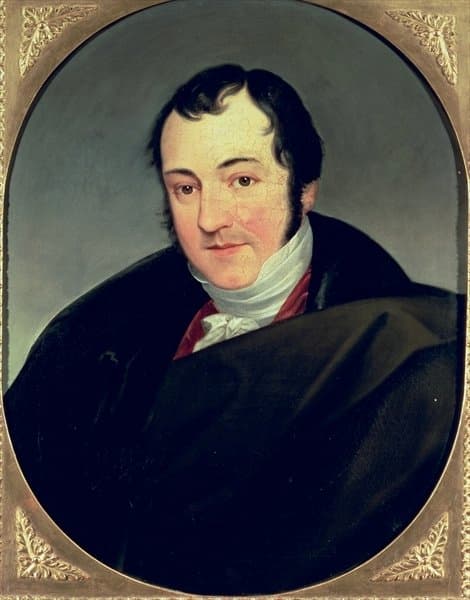
Karl Thomas Mozart © Wikipedia
A few months later, around the start of 1784, Constanze got pregnant again. She had Karl Thomas Mozart in September.
Wolfgang died when Karl was seven years old. Later in life, he advanced the theory that his father had been poisoned, although, of course, being just a child, he couldn’t have known if such a thing had really happened.
He went to school in Prague and studied music with Franz Xaver Niemetschek (the first biographer of Wolfgang Mozart) and composer František Xaver Dušek.
When he was twenty-one, he moved to Milan, where he would live for the rest of his life. He tried to make a career in music, but in his mid-twenties he gave up and went into accounting and Italian translating instead.
He earned enough royalties from Wolfgang’s music that he was able to buy a country estate in the township of Valmorea, near Lake Como.
He never got married or had any children, and he died in 1858 at the age of seventy-four.
Johann Thomas Leopold Mozart (18 October 1786 – 15 November 1786)
In 1786, Wolfgang’s big musical project was composing and mounting The Marriage of Figaro, which premiered in May. In January 1787 he went to Prague to conduct a production of it.
In between, Constanze gave birth to their third son, but he died just a month later of “Stickfrais”, which was a term that meant breathing difficulties. It may have been something like whooping cough or lung disease.
Theresia Constanzia Adelheid Friedericke Maria Anna Mozart (27 December 1787 – 29 June 1788)
Just after Christmas 1787, Constanze gave birth to the couple’s first daughter, to whom they gave a very long name. By using the name Maria Anna, they were paying tribute to Mozart’s musician sister, Maria Anna Mozart (also known as Nannerl).
Tragically, their daughter died of intestinal trouble in the summer of 1788. This was the same summer that Mozart wrote his 39th, 40th, and 41st symphonies…a feat that’s difficult to imagine.
Mozart: Symphony No. 40 in G Minor, KV 550
Anna Maria Mozart (born and died on 16 November 1789)
In the spring of 1789, when Constanze was pregnant, Wolfgang left Vienna.
He had racked up considerable debt and decided to travel to Dresden, Berlin, and Prague to give concerts to make money. For an entire month after he left, no letters arrived, to Constanze’s great distress.
Wolfgang eventually returned to Vienna, only to find Constanze sick with a leg ulcer. In fact, there was a question of whether she was going to recover. Wolfgang reported in a letter to friends that she was calmly facing her fate, whatever it might be.
Fortunately, she recovered, and after she entered her third trimester, they went to Baden, a spa resort.
Anna Maria Mozart, Wolfgang and Constanze’s fifth child and second daughter, was born in mid-November. She was named after Mozart’s late mother, who had died in 1778. Tragically, she died an hour after she was born. She was baptized before her death and buried the next day.
Franz Xaver Wolfgang Mozart (26 July 1791 – 29 July 1844)
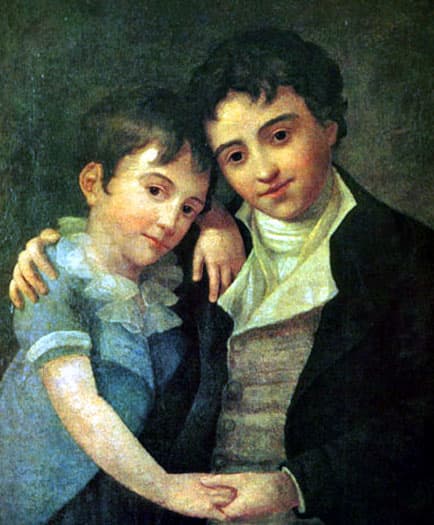
Karl and Franz Xaver Mozart © Wikipedia
The Mozarts’ final baby, Franz Xaver Wolfgang Mozart, was born in the summer of 1791. Although he was just an infant when his father died, he ended up being the child who would carry on the Mozart family reputation in the music world. He also inherited the name Wolfgang, which he’d be called by his family.
He was musically talented as a child. Although his older brother believed that their father may have been poisoned, Wolfgang the younger took lessons from Antonio Salieri, who is sometimes named as one of the potential suspects. This is perhaps proof of how unserious his mother took the poisoning rumors. He also studied with Johann Nepomuk Hummel.
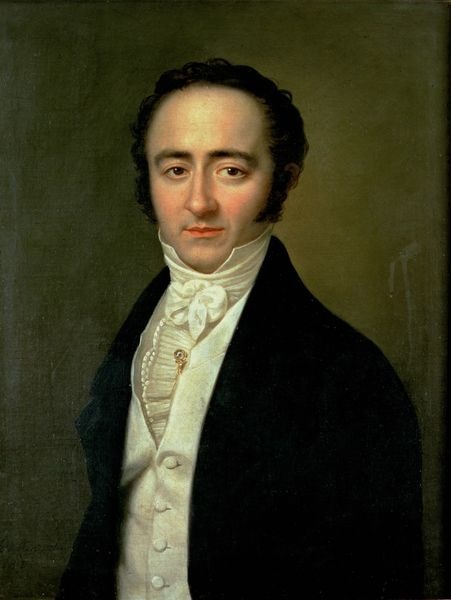
Franz Xaver Mozart (1825) by Karl Gottlieb Schweikart
Wolfgang, Jr., made his debut in Vienna in April 1805 at the Theater an der Wien, where Beethoven had given multiple legendary premieres over the previous few years.
He spent most of his career teaching and traveling, performing his own works and the works of his father.
However, he simply wasn’t as talented as his father, and he knew it.
He died a few days after his fifty-third birthday of stomach cancer. His poignant epitaph reads, “May the name of his father be his epitaph, as his veneration for him was the essence of his life.”
For more of the best in classical music, sign up for our E-Newsletter
